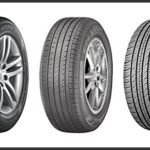Winter tires provide better grip and traction in cold weather and on icy or snowy roads compared to all-season tires. Choosing the right tires for your car can sometimes be confusing.
Some drivers use all-season tires all year round, while others switch between winter and all-season tires depending on the weather. If you live in an area with harsh winter conditions, you may want to consider investing in a set of winter tires for your car.
Winter tires are designed to perform better in cold weather, snow, ice, and slush than all-season tires. While all-season tires can handle mild winter conditions, they may not provide the same level of traction and grip as winter tires when temperatures drop below freezing. In this article, we’ll take a closer look at winter tires vs. all-season tires to help you make an informed decision when choosing the right tires for your car.

Credit: www.youtube.com
Understanding Winter Tires And All Season Tires
Winter tire vs. all season: which is better for your car? Understanding winter tires and all season tires
Winters can be harsh, and with the temperatures plummeting, it’s crucial to ensure your car is safe for the roads. One of the most vital aspects is your car’s tires, and choosing the right kind can make all the difference.
We will explore the two most popular types of tires and help you understand which is the better option for you.
Definition Of Winter Tires And Their Key Features
Winter tires, also known as snow tires, are designed to perform in cold weather conditions, mainly temperatures below 7 degrees celsius. Their main purpose is to provide excellent grip on slippery, icy, and snow-covered roads.
Here are some of the key features of winter tires:
- Deeper treads with a more significant number of sipes (small slits in the tread pattern) to increase traction on snow and ice.
- They are made with a softer rubber compound that stays pliable even in low temperatures.
- Provide better braking ability on snow and ice, reducing the stopping distance.
- They offer superior cornering ability, which helps improve overall handling in harsh winter conditions.
Definition Of All Season Tires And Their Key Features
All-season tires, as the name suggests, are designed to provide adequate performance all year round, including summer and winter. These types of tires are a popular choice among many drivers as they provide decent stability, traction, and handling under most driving conditions.
Here are some of the key features of all-season tires:
- A versatile tread design that can provide stable handling in both dry and wet conditions.
- Made with a hard rubber compound, which ensures good wear and long-lasting tread life.
- They offer a comfortable ride and good fuel economy for everyday commuting and driving.
Comparison Of The Two Types Of Tires
Winter tires and all-season tires are both created for specific driving conditions, and choosing the right one for your car depends on a few factors. Here is a comparison of how they fare in different circumstances:
- Traction: Winter tires offer significantly better traction on snow, ice, and slush than all-season tires. On the other hand, all-season tires provide a decent grip in mild winter conditions and can handle light snow.
- Braking: Winter tires provide shorter stopping distances on icy and snowy roads, while all-season tires take longer to stop.
- Handling: Winter tires have superior handling in harsh winter conditions, while all-season tires provide stable handling in most driving conditions.
- Wear and tear: Winter tires are not suitable for summer conditions and can wear out quickly in warm weather. All-season tires last longer and provide adequate performance throughout the year.
- Cost: Winter tires are more expensive than all-season tires. However, investing in a good set of winter tires can offer a safer and more comfortable driving experience in harsh winter conditions.
Choosing between winter tires and all-season tires depends on where you live, the driving conditions you regularly face, and your budget. Winter tires provide better performance in harsh winter conditions, while all-season tires offer versatility and long-lasting tread life. Whichever tire type you choose, make sure they are suitable for your car, your driving habits, and the environmental conditions you face.
The Benefits Of Winter Tires
Winter tire vs. all season: which is better for your car?
Winter driving can be challenging for many drivers. In areas with harsh winter conditions, having winter tires can significantly improve your driving experience, ensuring that you and your passengers stay safe on the road. In this post, we’ll examine the benefits of winter tires versus all-season tires.
Improved Traction And Performance In Harsh Winter Conditions
Winter tires are specifically designed to provide superior traction on snowy, icy, and wet roads. They have deeper tread patterns and softer rubber compounds, which helps them maintain grip and stability on cold, slippery surfaces.
Some key features of winter tires that contribute to their superior performance in harsh winter conditions include:
- Tread patterns designed to provide strong grip on snow and ice.
- Softer rubber compounds that remain flexible in cold temperatures, improving braking and handling.
- Deeper grooves and channels that help to evacuate slush and water from beneath the tire, reducing hydroplaning.
Winter tires can help improve your vehicle’s traction, handling, and performance in cold, harsh winter conditions.
Enhanced Safety Features On Winter Roads
Winter tires can also provide enhanced safety features on winter roads. When driving on snow and ice, stopping distances can be much longer than on dry pavement. Winter tires can help reduce stopping distances and improve overall driving safety by providing better traction and control in winter conditions.
- Winter tires help reduce the risk of skidding and sliding on snow and ice.
- Winter tires can help improve braking, making it easier to stop your vehicle quickly.
- Having winter tires installed can also make driving safer for other road users, reducing the likelihood of accidents caused by loss of control or skidding.
Cost-Effective Solution For Long-Term Use
While purchasing winter tires may seem like an added expense, it can be a cost-effective solution for long-term use. When you invest in winter tires for your vehicle, you are potentially extending the lifespan of both your winter and all-season tires.
- Winter tires wear more slowly in cold weather conditions than all-season tires, meaning they last longer.
- By using winter tires on your vehicle in the winter months, you can save wear and tear on your all-season tires.
- Belt mounting and demounting of winter tires each season prolongs the life of all of your tires.
While all-season tires may seem like they can handle any weather conditions, winter tires can provide important safety features needed on winter roads. They offer improved traction and performance on harsh roads, enhanced safety features, and can be a cost-effective solution for long-term use.
Keep your vehicle and your passengers safe this winter by investing in a set of winter tires.
The Benefits Of All Season Tires
Winter tire vs. all season: which is better for your car?
Are you confused about which tires to choose for your vehicle during the winter season? The options available to drivers can be overwhelming, but understanding the differences between winter tires and all-season tires can help you make an informed decision.
We will focus on the benefits of all-season tires, which are popular among drivers for their versatility and cost-effectiveness.
Versatility And Adaptability To Various Weather Conditions
All-season tires are designed to provide adequate traction on both dry and wet roads, making them a suitable option for various weather conditions. While winter tires are optimized for snowy and icy terrains, all-season tires strike a balance between winter and summer tires, allowing drivers to use them throughout the year.
These tires have a broader temperature range compared to winter tires and do not become too rigid in cold temperatures, making them a good choice for mild winter areas.
A Great Option For Drivers In Mild Winter Areas
If you reside in an area that experiences mild winter conditions, all-season tires are a great option for your car. In such areas, the temperature rarely drops below freezing, and snowfall is infrequent. However, having all-season tires on your car provides an added layer of safety and ensures better handling and traction in case of unexpected weather changes.
Cost-Effective For Short-Term Use
Winter tires are expensive and only suitable for seasonal use, which means you will have to replace them once winter is over. On the other hand, all-season tires are relatively cheaper than winter tires and can be used throughout the year, making them cost-effective for short-term use.
Additionally, these tires also offer better gas mileage and tread life compared to winter tires, making them an affordable investment for drivers.
All-season tires are versatile, adapt to different weather conditions, and can be used in mild winter areas. Choosing all-season tires can save you money in the long run and provide you with better traction, handling, and gas mileage. However, if you live in a region that experiences heavy snowfall and extreme winter weather, winter tires are necessary to ensure your safety on the road.
Remember to always consider your driving needs and the weather conditions in your area when choosing tires for your car.
The Drawbacks Of Winter Tires
Winter Tire Vs. All-Season: Which Is Better For Your Car?
Winter tires and all-season tires are two different beasts, each with its own pros and cons. While winter tires are specifically crafted to navigate through icy and snowy conditions to provide excellent grip and braking, all-season tires are meant to work well in all different types of weather.
But, what are the key drawbacks of winter tires? Continue reading this blog to find out more.
Limited Performance On Dry And Warm Roads
Winter tires are built with deep and wide grooves that are specifically designed to provide better traction on ice and snow. These grooves tend to create a lot of noise and vibration and are not suitable for use on dry and warm pavement, especially during extended periods of driving.
The softer rubber material of winter tires isn’t optimized for use on dry and warm roads, which can negatively impact your vehicle’s handling and braking.
- Winter tires are not intended for use on dry pavement, and so they don’t perform well in these conditions.
- The deep and wide grooves prevent the vehicle from achieving good fuel efficiency, making it harder to control the car on dry and warm pavement.
- The softer compound of winter tires isn’t optimized for driving on hot surfaces, resulting in decreased handling and braking performance.
Reduced Fuel Efficiency In Warmer Months
Another significant drawback of winter tires is that they tend to exhibit reduced fuel efficiency, causing your car to burn more fuel. This is because winter tires have a higher rolling resistance than all-season tires, and this resistance further increases on warmer surfaces.
As a result, your car uses more energy to move forward, resulting in decreased fuel efficiency and increased fuel consumption.
- Winter tires have a higher rolling resistance than all-season tires, meaning they require more energy to move forward. As a result, the car burns more fuel, using more energy to move.
- When winter tires are used during warmer temperatures, the softer rubber compound tends to wear out faster, resulting in a decrease in fuel efficiency.
- During the summer months, the softer material of winter tires results in increased heat retention and increased rolling resistance, accelerated wear and tear, and decreased fuel efficiency.
Higher Initial Cost Of Quality Winter Tires
Lastly, quality winter tires can be a bit expensive when compared to all-season tires. This added cost can be a drawback for those who don’t live in areas with harsh winter conditions as winter tires may not be needed year-round.
The cost of snow tires varies depending on the brand and tire size, and this might not be feasible for everyone.
- Quality winter tires only offer seasonal use, making them not cost-effective for those who don’t live in areas with harsh winters.
- The softer rubber material used in winter tires is more expensive than the material used in all-season tires, contributing to a higher initial cost.
- Winter tires need to be periodically changed, adding to the overall cost.
Winter tires have significant drawbacks. However, if you live in an area that experiences harsh winter weather, they will be beneficial for your safety and overall driving experience. Consult a tire dealer for the best guidance.
The Drawbacks Of All Season Tires
Winter tire vs. all season: which is better for your car?
If you live in an area that experiences harsh winters, you may be wondering whether all-season tires are good enough for your car. After all, all-season tires are marketed as being suitable for all weather conditions. However, the drawbacks of all-season tires are something to consider before making a decision for your winter driving needs.
Reduced Safety And Performance In Harsh Winter Conditions
All-season tires are not as effective as winter tires in harsh winter conditions. Here are some reasons why:
- All-season tires are made from a harder rubber compound which becomes stiffer in cold weather, making them less effective in providing traction on icy roads.
- As temperatures drop below 7°c, the rubber in all-season tires begins to harden, reducing grip and making them less responsive to steering and braking.
- In deep snow, all-season tires lack the tread depth needed for optimal traction, resulting in reduced safety and performance in harsh winter conditions.
Shorter Lifespan Compared To Winter Tires
All-season tires may not last as long as winter tires, which can be a disadvantage for those on a tight budget. Here’s why:
- All-season tires are designed to provide a compromise between hot and cold weather conditions, meaning they may not perform as well as tires designed specifically for one season.
- In harsh winter conditions, because all-season tires do not grip well, there is a greater chance of the tires wearing unevenly or becoming damaged more quickly, leading to a shorter lifespan.
Costly To Replace Due To The Need To Buy New Tires More Frequently
If you live in an area with snow and ice, all-season tires may not be sufficient for your winter driving needs. As a result, you may have to invest in winter tires to ensure your safety on the road. Here are some points to consider when deciding whether to go for all-season or winter tires:
- If you choose to buy all-season tires, you may find yourself needing to replace them more frequently than winter tires, which can be costly over time.
- Winter tires are not inexpensive, but they usually last several seasons because they’re not used all year round like all-season tires.
- Investing in winter tires is a wise decision even if you don’t face severe winter weather conditions all the time. The added safety and peace of mind that comes with them is priceless.
It’s important to consider the drawbacks of all-season tires before you make a decision for your winter driving needs. Although all-season tires may seem like a cost-effective option, they may not provide sufficient traction on snow and ice, putting you and other road users at risk.
If you live in an area with severe winter conditions, investing in winter tires is undoubtedly the better option.
What To Consider When Choosing Between Winter Tires And All Season Tires
Your Location And Prevailing Weather Conditions
When considering the type of tires to use for your car during winter, the first factor that you should consider is your location and prevailing weather conditions. Winter tires are designed to provide excellent traction on snow, ice, and cold, wet roads.
They are made from unique rubber compounds, which remain soft and pliable even in very cold weather. If you’re living in regions with extreme winter conditions, such as snow and ice storms, winter tires will prove to be a better investment than all-season tires.
On the other hand, all-season tires are designed to be used all year round and are formulated to handle varying weather conditions. However, they cannot provide the level of grip and traction you need when the temperature drops below 7 degrees celsius, the point where winter tires provide the best performance.
Frequency And Type Of Driving
Another factor that you should consider when making the decision between winter tires and all-season tires is the frequency and type of driving you do. If you drive frequently, especially over long distances, you may need to go for all-season tires as they are designed to provide more extended tread life and better fuel efficiency.
However, if you mostly take short trips and drive in severe winter conditions, it’s better to invest in winter tires as they will offer better safety, control and handling during harsh weather conditions.
Your Budget And Long Term Goals For The Car
Lastly, your budget and long-term goals for the car should also be considered when making the decision between winter tires and all-season tires. Winter tires will cost more than all-season tires and may require an additional set of rims, which can increase the cost further.
However, if you live in a region with harsh winters, the investment could be worth it since winter tires provide better safety and control, significantly reducing your risk of being involved in an accident. Additionally, if you plan to keep the car for an extended period, it’s better to invest in winter tires as they will prolong the life of your car tires and save you money that you would have spent replacing worn-out tires.
On the other hand, if you’re on a tight budget or planning to replace your car soon, you may go for all-season tires as they provide a balance between durability, affordability, and versatility.
Choosing between winter tires and all-season tires should be carefully evaluated based on your unique circumstances. Consider the location and prevailing weather conditions, the frequency and type of driving, and your budget and long-term goals for the car when deciding on which type of tires to invest in.
Ultimately, investing in proper tires for your car is a wise move, ensuring that you can stay safe and comfortable regardless of the weather conditions.
Frequently Asked Questions On Winter Tire Vs All Season For Car
What Are Winter Tires Made Of?
Winter tires are made of rubber that is engineered to stay flexible in cold temperatures. They also have multidirectional treads that offer better traction on snow and ice.
Can I Use All-Season Tires In The Winter?
All-season tires can be used in light winter conditions but they don’t provide the necessary traction for severe winter weather. It’s best to switch to winter tires when the temperature drops significantly and snow or ice is on the ground.
How Long Do Winter Tires Last?
Winter tires typically last for 2-5 seasons depending on factors like driving habits, road conditions, and how often they are used. It’s important to monitor the tread depth and replace them when it wears down to 6/32-inch to ensure proper performance and safety.
Conclusion
Overall, both winter tires and all-season tires have their own unique benefits and limitations to consider when deciding which one to choose for your car. Winter tires excel in providing excellent grip and traction on snow, ice, and slushy roads, while all-season tires can provide decent performance in many different weather conditions.
It ultimately comes down to personal preference and the specific climate and driving conditions of your area. However, it’s important to remember that regardless of which tires you choose, proper maintenance and regular inspections are crucial to ensure optimal performance and safety.
Investing in high-quality tires and using them responsibly can make all the difference in your driving experience during the winter months. So do your research, weigh the options, and make an informed decision that will keep you safe on the road.

Emily started her career in digital marketing but quickly fell in love with the automotive niche. She believes great content should simplify complex topics — especially for car owners who just want practical advice. At RevivalCar, Emily ensures every article is easy to follow, well-researched, and genuinely helpful for readers across the U.S.










